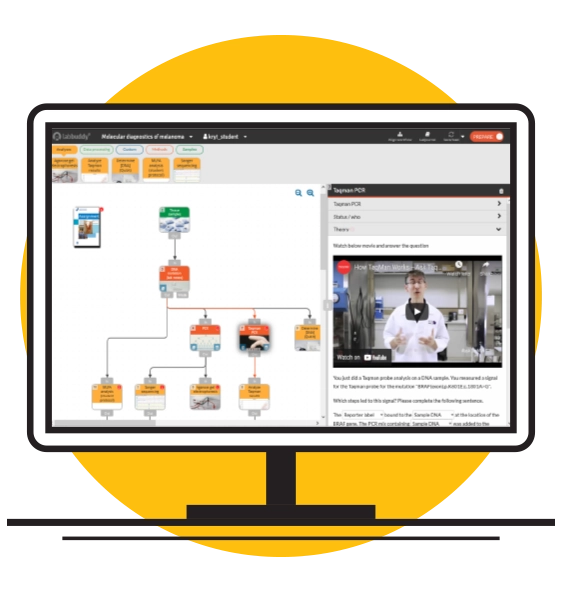LabBuddy enhances
laboratory education
LabBuddy’s e-learning solution supports students
before, during, and after their practical work.
LabBuddy’s e-learning solution supports students
before, during, and after their practical work.
The lab is an important place where students build scientific research skills. As a teacher, you want to teach your students how to perform research. But chances are you feel constraint due to low motivation, large groups, or unprepared students. Because of this, many teachers deal with high work pressure.
This is where LabBuddy comes in.
LabBuddy provides an e-learning solution to supplement traditional practical education by creating a form of blended learning. LabBuddy helps students prepare before the start of the practical work, supports them while working in the lab or field, and guides them during the processing of their results after the practical work.


LabBuddy offers an e-learning solution to make sure students get the learning journey they need. This includes a built-in Experiment Designer in which students receive a toolbox and a canvas to design their experiment to answer a research question. LabBuddy is designed to be used in various ways depending on the lab course. This enhances the learning process of students at BSc and MSc level.
LabBuddy helps students to understand the experiment before the practical class, making sure they know better what they are doing.
Students are motivated to prepare well and they gain confidence through built-in interactive feedback.
Students learn with automated feedback, so teachers no longer need to repeat their explanations. This allows teachers to cope with increasing student numbers.
Thanks to their good preparation, students start working quickly. They find the answers to their low level questions within LabBuddy instead of having to wait for assistance.






The e-learning solution provided by LabBuddy has been designed and is continuously improved based on scientific literature (Van der Kolk, 2013; Verstege, 2021). Here, we provide some scientific background information related to our e-learning solution. All mentioned educational theories are used to develop LabBuddy’s e-learning solution. Our scientists and developers continue to improve the e-learning solution using the newest insights in educational sciences and follow the latest developments in education technology.
Learning materials that use multimedia, on the condition that the graphics are not solely intended for decoration, keep students’ attention for a longer time (Keller, 1987), and were found to promote active and deep learning (Clark & Mayer, 2016).
Cognitive overload is one of the major problems during practical classes. Students are continuously bombarded with new information, leaving only a minimal time to process all the latest information. The cognitive load theory implies that instructional design should take the cognitive architecture of humans into account.
Based on the constructive alignment theory, there should be a clear relationship between the intended learning outcomes, the learning activities, and the assessment (Biggs & Tang, 2011). However, for traditional (‘cookbook’) practical classes, this is often not the case, which, for example, results in students not preparing before they enter the practical class.
When designing learning material, the designer should make sure to create a positive learning experience. One way to do so is by introducing motivational elements. Motivational elements can improve student learning by fostering cognitive processing aimed at making sense of the material (Mayer, 2014).
At LabBuddy, we gladly help you to get the most out of our e-learning solution. We offer several training programmes to teach you how to use the solution both didactically and technically.
A must-have for any teacher starting with LabBuddy!
The training consists of bi-weekly meetings to discuss the development of the teacher's practical course in LabBuddy together with an e-learning developer.
One step deeper than Bronze!
This training is intended for any teacher who wants to spend a little more time maintaining their course in LabBuddy and wants to create questions and feedback.
In this training, we assume that the participants are familiar with LabBuddy and have knowledge of the "Bronze" training.
Become an expert just like us!
This training is intended for those who want to implement a practical in LabBuddy completely independently, according to the LabBuddy standard!
This training focuses on various aspects of implementing LabBuddy in a practical. It includes educational principles and all functionality that LabBuddy offers. Knowledge of educational science and good computer skills are required! Having some programming knowledge is an advantage.
LabBuddy has developed a workshop about lab didactics specifically for teachers of lab courses and other parties involved in educational innovation.
During this workshop, participants are encouraged to think about their lab courses in a different way.
Please fill in the form below to schedule a demo, workshop, or training. You can also use this form to ask any other question. For technical support contact support@labbuddy.net.

Kryt B.V., the company responsible for LabBuddy, operates an information security management system that complies with the requirements in ISO/IEC 27001:2022 for the development, delivery and support of e-learning software, as defined by management and in accordance with our statement of applicability. We will send you this statement of applicability on request.
Please fill in the form below to register for a training. You can also use this form to ask any other question.